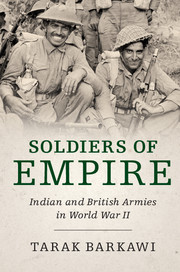Crossref Citations
This Book has been
cited by the following publications. This list is generated based on data provided by Crossref.
Lebow, Richard Ned
2018.
The Rise and Fall of Political Orders.
Das, Santanu
2018.
India, Empire, and First World War Culture.
MacKenzie, Megan
Gregory, Thomas
Shah, Nisha
Barkawi, Tarak
Haastrup, Toni
Eichler, Maya
Wegner, Nicole
and
Howell, Alison
2019.
Can we really “forget” militarization? A conversation on Alison Howell’s martial politics.
International Feminist Journal of Politics,
Vol. 21,
Issue. 5,
p.
816.
Malešević, Siniša
2019.
Handbook of Patriotism.
p.
1.
Fennell, Jonathan
2019.
Fighting the People's War.
Attewell, Nadine
and
Attewell, Wesley
2019.
Between Asia and empire: infrastructures of encounter in the archive of war.
Inter-Asia Cultural Studies,
Vol. 20,
Issue. 2,
p.
162.
Persaud, Randolph B.
2019.
Killing the Third World: civilisational security as US grand strategy.
Third World Quarterly,
Vol. 40,
Issue. 2,
p.
266.
Solomon, Ty
2019.
Rhythm and Mobilization in International Relations.
International Studies Quarterly,
Vol. 63,
Issue. 4,
p.
1001.
Farnan, Robert A.
2019.
Unknown Conflicts of the Second World War.
p.
120.
Powel, Brieg
2020.
Blinkered Learning, Blinkered Theory: How Histories in Textbooks Parochialize IR.
International Studies Review,
Vol. 22,
Issue. 4,
p.
957.
Adamson, Fiona B
2020.
Pushing the Boundaries: Can We “Decolonize” Security Studies?.
Journal of Global Security Studies,
Vol. 5,
Issue. 1,
p.
129.
Powel, Brieg
2020.
Whither IR? Multiplicity, relations, and the paradox of International Relations.
Globalizations,
Vol. 17,
Issue. 3,
p.
546.
Henry, Marsha G.
2020.
Why critical military studies needs to smash imperial white supremacist capitalist heteropatriarchy: a rejoinder.
Critical Military Studies,
Vol. 6,
Issue. 1,
p.
107.
Banerjee, Kiran
and
MacKay, Joseph
2020.
Communities of practice, impression management, and great power status: Military observers in the Russo-Japanese War.
European Journal of International Security,
Vol. 5,
Issue. 3,
p.
274.
Kelly, Tobias
2020.
Justice, Conscience, and War in Imperial Britain.
PoLAR: Political and Legal Anthropology Review,
Vol. 43,
Issue. 2,
p.
319.
Pardesi, Manjeet S.
2020.
The Indo-Pacific: a ‘new’ region or the return of history?.
Australian Journal of International Affairs,
Vol. 74,
Issue. 2,
p.
124.
Poulsen, Lauge N Skovgaard
2020.
Loyalty in world politics.
European Journal of International Relations,
Vol. 26,
Issue. 4,
p.
1156.
Malešević, Siniša
2020.
Handbook of Patriotism.
p.
671.
Ashworth, Lucian M.
2020.
Of global war and global futures. Rereading the 1940s with the help of Rosenboim and Barkawi.
Cambridge Review of International Affairs,
Vol. 33,
Issue. 1,
p.
3.
Bousquet, Antoine
Grove, Jairus
and
Shah, Nisha
2020.
Becoming war: Towards a martial empiricism.
Security Dialogue,
Vol. 51,
Issue. 2-3,
p.
99.



